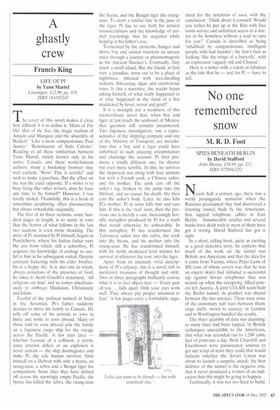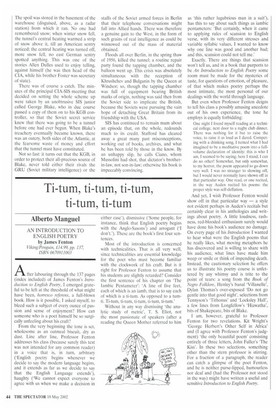No one remembered snow
M. R. D. Foot
SPIES BENEATH BERLIN by David Stafford John Murray, £16.99, pp. 211. ISBN 0719563232 Nearly half a century ago, there was a world propaganda sensation when the Russians proclaimed they had discovered a listening tunnel, built by the Americans, that tapped telephone cables in East Berlin. Innumerable articles and several books have dealt with it; most of them have got it wrong. David Stafford has got it right.
In a short, telling book, quite as exciting as a good detective story, he explains that much of the work on the tunnel was British. not American; and that the idea for it came from Vienna, where Peter Lunn of SIS (one of whose covers was that he was an expert skier) had initiated a successful tap against Soviet telephones that was wound up when the occupying Allied powers left Austria. A joint CIA-SIS team built the Berlin tunnel; its product was shared between the two services. There were none of the customary turf wars between them; large staffs, sworn to secrecy, in London and in Washington handled the results.
The sheer quantity of data was daunting: so many lines had been tapped, by British techniques unavailable to the Americans, that what was recorded ran to 1,200 cubic feet of print-out a day. Both Churchill and Eisenhower were passionately anxious to get any scrap of news they could that would indicate whether the Soviet Union was about to launch a surprise attack; the best defence of the tunnel is the negative one, that it never produced a tremor of an indication that this might be going to happen.
Technically, it was not too hard to build. The spoil was stored in the basement of the warehouse (disguised, above, as a radar station) from which it ran. No one had remembered snow; when winter snow fell, the tunnel's central heating warmed a strip of snow above it, till an American sentry noticed; the central heating was turned off, more snow fell, no east German sentry spotted anything. This was one of the stories Allen Dulles used to enjoy telling, against himself (he was then head of the CIA, while his brother Foster was secretary of state).
There was of course a catch. The minutes of the principal CIA-SIS meeting that decided on setting the whole scheme up were taken by an unobtrusive SIS junior called George Blake, who in due course passed a copy of them on to his KGB controller, so that the Soviet secret service knew that there was going to be a tunnel before one had ever begun. When Blake's treachery eventually became known, there was an outcry, both sides of the Atlantic, at the fearsome waste of money and effort that the tunnel must have constituted.
Not so fast: it turns out that the KGB, in order to protect their all-precious source of Blake, never told either their rivals the GRU (Soviet military intelligence) or the staffs of the Soviet armed forces in Berlin that their telephone conversations might fall into Allied hands. There was therefore a genuine gain to the West, in the form of such grains of real intelligence as could be winnowed out of the mass of material obtained.
Floods all over Berlin, in the spring thaw of 1956, killed the tunnel; a routine repair party found the tapping chamber, and the balloon went up. This crisis was absolutely simultaneous with the reception of Khrushchev and Bulganin by the Queen at Windsor; so, though the tapping chamber was full of equipment bearing British marks of origin, nothing was said then from the Soviet side to implicate the British, because the Soviets were pursuing the vain hope of detaching Great Britain from its friendship with the USA.
SIS has continued to remain mum about an episode that, on the whole, redounds much to its credit. Stafford has cleared away a great many past misconceptions, working out of books, archives, and what he has been told by those in the know. By an unhappy slip, he calls Ciano, whom Mussolini had shot, that dictator's brotherin-law, not son-in-law; otherwise his book is impeccably convincing. as 'this rather lugubrious man in a suit'), has this to say about such things as iambic pentameters: 'But certainly, when it came to applying rules of scansion to English verse, with its very different stresses and variable syllabic values, I wanted to know why one line was good and another bad; and this. scansion could not tell me.'
Exactly. There are things that scansion won't tell us, and in a book that purports to be An Introduction to English Poetry some room must be made for the mysteries of taste, for questions of emotion, of pleasure, of that which makes poetry perhaps the most intimate, the most personal of our dealings with the world through language.
But even when Professor Fenton deigns to tell his class a possibly amusing anecdote out of his own experience, the tone he employs is equally forbidding:
One night I found myself reading at a technical college, next door to a rugby club dinner. There was nothing for it but to raise the voice, to raise it as loud as I dared. Competing with a drinking song, I turned what I had imagined to he a meditative poem into a fullvolume declaration of identity: this is who I am, I seemed to he saying; here I stand, I can do no other! Somewhat, but only somewhat, to my horror, the poem appeared to go down very well. I was no stranger to showing off, but I would never normally have shown off in that particular way. One read, or one recited, in the way Auden recited his poems: the proper style was self-deflation.
And yet, I wish Professor Fenton would show off in that particular way — a style not evident perhaps in Auden's recitals but certainly clear in his anthologies and writings about poetry. A little loudness, rashness, red-blooded enthusiasm surely would have done his book's audience no damage. On every page of his Introduction I wanted to hear what were the English poems that he really likes, what moving metaphors he has discovered and is willing to share with his audience, what lines have made him weep or smile or think of impending death. Instead, the cautionary selection he offers us to illustrate his poetry course is unfettered by any whimsy and is trite to the point of tears: a song from the Book of Negro Folklore. Henley's banal 'Villanelle', Dylan Thomas's over-exposed 'Do not go gentle into that good night', selections from Tennyson's `Tithonus' and tocksley Hall', a few lines from Longfellow's 'Hiawatha', bits of Shakepeare, bits of Blake.
I am, however, grateful to Professor Fenton for two revelations. Kit Wright's 'George Herbert's Other Self in Africa' and (I agree with Professor Fenton's judgment) 'the only beautiful poem' consisting entirely of three letters, John Fuller's 'The Kiss'. In these two selections, something other than the stern professor is stirring. For a fraction of a paragraph, the reader can catch a glimpse of the poet Fenton, and he is neither purse-lipped, humourless nor deaf and (had the Professor not stood in the way) might have written a useful and sensitive Introduction to English Poetry.















































































 Previous page
Previous page